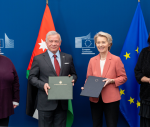You are here
Comprehensive strategy to change curricula
Oct 09,2016 - Last updated at Oct 09,2016
Changes in school curricula have stirred much debate and discussion in the country.
It is important to look at this issue from all perspectives.
Many people find it difficult to rule out conspiracy theories when it comes to any change. On the other hand, change is usually resisted, and this is normal.
Think of a body in need of a new organ: it will still trigger an immune response that attacks the organ that is saving its life.
Still, there are many questions regarding both the need for change and the strategy to achieve it.
Developing and improving the school curricula is a must; it should be done in a systematic and continuous process that takes into consideration the progress of education and the evolution of human thought.
This is a basic evolutionary and renovating process that needs to be done with the full understanding of both the objective and the kind of change being effected.
As such, in order to achieve success, there needs to be a phase of psychological preparation and community education that promotes and explains the reasons for the changes, and prepare people not just to accept changes but also to agree with the need to achieve them.
This is one of the major challenges in any strategy of change, and even more so when it comes to school curricula.
This process of change should begin with the preparation and anticipation of schoolteachers who understand the need for change, the challenges and risks that face society and the goal that these changes seek.
Jordan already faces many challenges, including violence and radicalisation, and they are growing by the day.
These challenges should be faced comprehensively, with every institution being part of the strategy used to tackle them.
Changes to the curricula are designed to shape and mould our responses to cultural issues, both today and for the next generations.
But it is not just the curricula that need to be changed. Extra-curricular activities, such as arts and sports, are much more important to the development and strengthening of culture.
It is also important to promote the culture of pluralism, tolerance, coexistence, acceptance and diversity.
This can be also only be achieved through multiple channels and methods other than academic.
One of the key challenges all countries are facing is how their citizens approach and manage the issue of global citizenship.
Distance and differences are narrowed by technological advances.
Jordan is part of this world and must be a part of these changes.
So the aims and objectives for any change should be to prepare Jordanians to integrate and function as global citizens.
We should give our future generations every chance to succeed globally by giving them the tools and understanding to achieve continuous positive change.
As a society, we should support and promote this agenda, so the architects of change can find a grassroots support base within the society.













